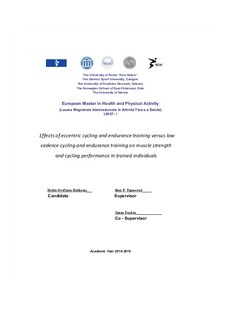| dc.description.abstract | Background: Recent studies have shown a positive effect of concurrent strength and endurance training on performance in cycling. Still, few studies have investigated the effect of eccentric cycling (ECC) and low cadence cycling (LCC) on muscle strength and determinants of cycling performance.
Aim: Compare the effect of concurrent ECC and endurance training with concurrent LCC and endurance training on strength development, muscle thickness, and cycling performance in trained individuals.
Method: 23 trained men participated in a 10-week supervised training program. One group (mean age: 36.3 years, SD: 13.4) were randomly assigned ECC and aerobic intervals (n=12), while the other group (mean age: 29.4 years, SD: 10.2) were allocated to LCC and aerobic intervals (n=11). Outcome measures were knee extension peak torque (Nm), muscle thickness (cm), maximum oxygen consumption (VO2max), maximum aerobic power output (Wmax), lactate threshold (LT), cycling economy and performance during a 20 min all-out.
Results: Significant improvements were seen in both groups for VO2max (mL/min/kg), Wmax, and LT expressed as VO2 and power output. The LCC-group increased mean power output during the 20 min all-out more than the ECC-group, while the ECC-group demonstrated larger increases for peak torque in eccentric knee extension than the LCC-group. The ECCgroup had a significant increase in m. quadriceps femoris muscle thickness and a significant decline in peak torque in concentric knee extension at 60°/second. No improvements were seen in either group for percentage of VO2max at the LT or cycling economy.
Conclusion: ECC does not seem to give any positive effects on cycling performance or determinants of cycling performance compared with LCC. However, ECC seems to be more effective in improving muscle strength than LCC. The strength improvements seem to be contraction specific and are related to increased muscle thickness. | nb_NO |
